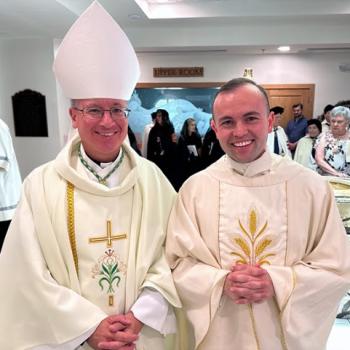Dear Christian parents,
I've got a deal for you. It's simple: If you sign up for my program, there's a roughly 80 percent chance that the man's happiness will increase substantially. And women, there's about a 50 percent chance you'll be happier as well. Sounds good, right? After all, happiness can be tough to come by. How about a few less sleepless nights? A few more smiles? And what about some joy? I bet you could really go for some joy.
The cost? Oh yes, the cost. Nothing's free, after all. Here's the thing. If you join my program, your kids will likely become more depressed and anxious. They'll have a much greater chance of being abused, living in poverty, and becoming addicts. That's the cost. In short, I'm asking you to purchase your own happiness at the cost of your children's happiness, not to mention their safety and mental health.
Deal?
Almost any self-respecting Christian parent would throw me out of their house. Could there be anything more obviously selfish? Can you imagine something that more perfectly contradicts Christ's call to deny yourself, take up your cross, and follow Him?
Yet that's the deal millions of Christian parents willingly choose every year and then defend zealously. That deal is called divorce.
For more than three decades, the American Christian Church has participated fully and completely in the institution of no-fault divorce. Sacred bonds formed before God -- bonds that take two to form and two to live -- can be severed at the whim of one. Even worse, they're often severed even when Christian spouses are living fully immersed in the church culture. I've been in "accountability groups" that offer more empathy than accountability. I've seen counselors become puppet-masters for their emotionally vulnerable clients, marching them out of marriages the counselor subjectively views as dysfunctional. And I've read fashionable Christian bestsellers that offer such sweeping indictments of "judgment" in the church that they blur the distinction between judgment and mere reading comprehension.
After all, it was God who said He hates divorce. It's His word that limits divorce to very narrow and explicit circumstances.
And yet, sadly, when Christians make this point (even lovingly and with full acknowledgment of our fallen natures), when they merely echo God's condemnation of a practice that we know -- beyond a shadow of a doubt -- takes a fearful toll on children's lives, they often face pure vitriol in response. We're told to mind our own business, that we don't understand the complexities of the situation, that we can't possibly want the husband or wife to face the "hell" of life with their spouse.
But aren't we otherwise very eager to proclaim truth when lives are being destroyed? Does anyone doubt the evils of drug addiction despite the complexities of its origin? Don't we intervene dramatically to save friends who are alcoholics or addicts? We certainly and rightly condemn racism, knowing its horrific toll on our culture and on the individual human heart. But aren't the roots of racism also complex? Is it really the case that within every racist is the beating heart of pure evil?
Throughout my Christian life, I've heard much talk of "social justice," often defined as the desire to create a society that is more compassionate, helps the hurting, and lifts up the impoverished. Putting aside my serious qualms with the very concept of social justice (that's the a subject for another column), I find it interesting that in most discussions of poverty and cultural decay, one rarely hears of the simplest and most obvious solution: marriage.
As I've noted before, 36.5 percent of single-parent, female-led households live in poverty. The poverty rate for married couples? A mere 6.4 percent. Want to protect children from abuse? An intact, mother-father family is the safest place for a child to live. Want children to be better educated? Again, the intact family is the best place for a kid to be.
It turns out that social justice begins at home.
We can do better. We have done better. But it takes something more than giving your wounded friend a shoulder to cry on. It takes something more than counseling. It takes something more than acceptance and assurances of forgiveness. We've been trying those methods, and yet we press forward, selfishly, toward our own happiness -- refusing to lay down our lives in that space that is most precious to us.
Church discipline might help. Peers and pastors with backbones might help. But at the end of the day the answer lies within the heart of the spouse, with awareness of his or her own brokenness and openness to the eternal truth of the Word. Fallen people living in a fallen world are often desperate for relief from their own choices and the anguish of their broken relationships. They cry out to God and to those closest to them for permission to leave, to break their covenant and seek the joy they feel they deserve.
Except in the narrowest of circumstances, God has already said "No." Do we have the courage to hear that compassionate answer?
11/29/2010 5:00:00 AM





